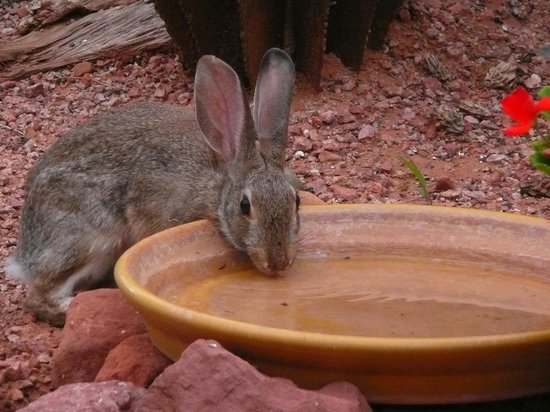

Polydipsia is the medical term for excessive thirst in rabbits. It’s not a condition or disease in itself, but rather a symptom of an underlying problem. The issue which is causing polydipsia in your rabbit could be medical. However, there could just as easily be an environmental or behavioral reason.
Some underlying causes of polydipsia can also cause more concerning symptoms, such as:
Increased or reduced appetite, Sluggishness and depression, Fever, Weight loss, Defecating less than usual, or diarrhea, Signs of pain, e.g., teeth grinding, Behavioral problems, such as aggression, Neurological issues, such as confusion or seizures.
Any of the above suggest your rabbit has an underlying medical condition. Two rabbits that are the same breed, age, and weight can have different drinking habits. Some rabbits seem to drink a lot, while others barely touch the water bowl. So, don’t compare your rabbit too closely to other rabbits. It’s far more crucial to get to know your rabbit’s behavior. Watch for any changes, and other symptoms occurring alongside polydipsia.
If you still think that your rabbit is drinking too much water, it’s time to investigate the cause. Figuring out what’s triggering polydipsia in rabbits can be difficult. This is because it can have so many different underlying causes.
Some explanations are trivial, and are a result of lifestyle changes. These are usually easy to spot, and simple to fix at home. Occasionally, however, extreme thirst in rabbits can be a sign of a medical condition, such as a disease.
So, why is my rabbit drinking a lot of water?
Dehydration
Though it may seem obvious, dehydration is often overlooked by rabbit owners. The reason your rabbit is drinking more than usual may be because they’re thirsty. Rabbits can become dehydrated easily. Diarrhea is one of the main causes of dehydration, as it results in a huge loss of water.
To tell whether your rabbit is dehydrated, there’s a simple skin test you can perform. Gently take the skin on the back of your rabbit’s neck in your hand. Lift the skin upwards, so that it stretches out, though not to the point that causes discomfort. Open your hand and release the skin.
If the skin snaps back to where it was immediately, your rabbit is healthy and hydrated. If it’s slow in returning to its original position, your rabbit is dehydrated.
Rabbits can become dehydrated for many reasons, some of which we’ll discuss below. If you’re not sure why your rabbit is dehydrated, take them to a veterinarian.
Changes in Diet
Rabbits may not be fussy eaters, but they are sensitive to an improper diet. Dietary problems can be the root cause of many behavioral concerns, including dehydration, and therefore, polydipsia.
In terms of excess thirst, two main dietary issues could be the problem:
– Excess salt. Too much salt can dehydrate the cells of a rabbit’s body, by extracting water from them. This can cause rabbits to become extremely thirsty.
– Not enough vegetables. Along with unlimited hay, rabbits should eat a portion of veg the size of their head per day. Rabbits get a lot of water from their daily salad, so a lack of vegetables can trigger thirst.
Try slowly upping your rabbit’s veg intake, but watch for signs of diarrhea. And if your rabbit has a salt lick, remove it. Salt licks are unnecessary for rabbits, and can do more harm than good.
Overheating
Have you ever noticed that you feel thirstier in hot seasons than in cold seasons? The same thing happens to rabbits. If your rabbit is in a sunny or warm area, they can quickly overheat due to their thick fur coat.
When we sweat, we lose a lot of water, so we drink more to regain the lost moisture.
Drinking cold water helps to cool rabbits’ bodies from the inside. They also lose heat through their ears. Along with polydipsia, signs your rabbit is overheating may include:
Hot ears, Listlessness, Lying with their body stretched out, A wet nose, Shallow, fast breathing, especially with mouth open, Tossing the head back, Nose twitching rapidly
Overheating can be deadly. So, move your rabbit to a cool area immediately. If possible, place an ice pack within their reach.
Pain
When rabbits are in pain, they don’t tend to make it obvious. This is because in the wild, showing that they’re hurt would make them a target for predators. For this reason, it’s tricky to tell that a rabbit is in pain. However, there are certain behaviors to look out for.
Changes in eating and drinking patterns are common. A rabbit may drink a lot more or less than usual. They may also grind their teeth, become aggressive, or sit hunched over for long periods.
Some of the most common causes of pain include:
– Dental issues. Examples include rotten teeth, malocclusion (dental misalignment), overgrown teeth or spurs (sharp spikes that grow on the teeth).
– Sore hocks – raw patches of skin that develop on the bottom of the foot.
– Arthritis
– Upset stomach, for example from eating too much
– Surgery, such as spaying or neutering surgery. A rabbit drinking a lot of water after surgery is a well-known phenomenon.
There are many reasons your rabbit might be in pain. Visit a veterinarian for an examination.
 Contact Jaguza Support
Contact Jaguza Support